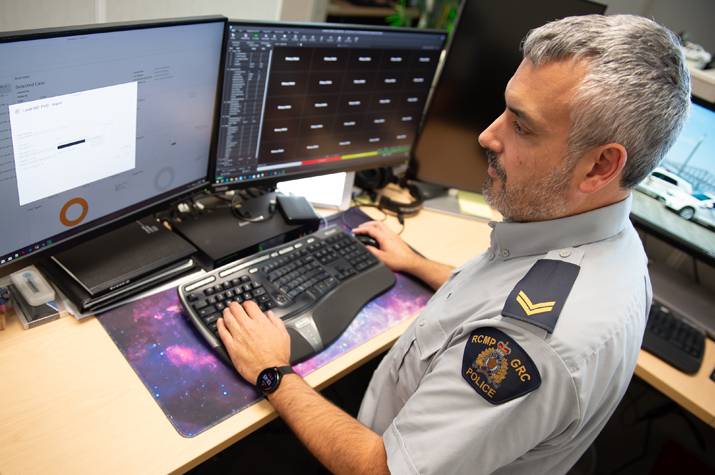Why Police Often Can’t Get Your Money Back After a Scam

Why Police Can’t Always Get Your Money Back
Imagine this:
You come home to find your apartment broken into. You call the police. They show up, take photos, ask questions. But when you say the person who did it already boarded a flight overseas, the officer looks at you with empathy and says:
“We want to help. But we can’t chase someone into another country without going through official channels. It takes time — and cooperation.”
This is exactly what happens in many online scam cases reported in Canada.
Even when law enforcement is willing to investigate, they often can’t recover stolen funds — not because they don’t care, but because they’re operating within a system that isn’t built to cross borders easily.
🌐 Most Scammers Aren’t in Canada
Many Canadians who fall for online scams believe the person on the other end is nearby — but in reality, they’re often thousands of kilometres away.
They could be:
- Running a fake trading platform from Eastern Europe
- Impersonating a financial advisor from Southeast Asia
- Posing as customer support from a remote call center
The money might flow through Canadian banks or crypto exchanges like Newton.co, Shakepay, or Crypto.com — but it rarely stays in Canada. It’s quickly converted, rerouted, or cashed out elsewhere.
So when people report these losses, Canadian police often have to say:
“We’ve filed the report — but there’s not much more we can do directly.”
🕵️ Police Investigate — But Aren’t Set Up to Recover Funds
Canadian law enforcement does take scams seriously. They investigate, track patterns, share intelligence, and try to stop large-scale fraud rings.
But they aren’t recovery agents — and that’s important to understand.
Police can:
- Open a file and document your case
- Connect your complaint to others
- Submit evidence to international partners
- Flag known fraud patterns to financial institutions
But they can’t:
- Freeze an account in Dubai
- Reverse a crypto transaction
- Pressure a foreign bank to cooperate
At least not without going through lengthy diplomatic, legal, and jurisdictional hurdles.
⏳ The Huge Volume of Cases Creates Another Challenge
Here’s another reality: Canadian law enforcement faces thousands of scam reports every month — and their human resources are limited. There simply aren’t enough investigators to work on every case at the same time.
This means:
- Many complaints have to wait in line
- Cases with smaller amounts or limited evidence may not be prioritized
- Scammers get precious time to disappear with the money, moving funds quickly before law enforcement can act
It’s like a busy emergency room: the most urgent cases get attention first, while others must wait — sometimes too long for action to help those affected.
💬 A True Story
After sending $78,807.18 to a fake investment site, Earle from Calgary went to the police with transaction receipts and chat logs.
The officer told him:
“We’re seeing a lot of these scams. The accounts are offshore, so we’ll file a report — but recovering the funds isn’t something we can do from here.”
Earle felt frustrated, but his case was added to a growing investigation that helped Canadian authorities flag a recurring pattern involving several banks.
The report may not have reversed the loss — but it helped stop others from falling into the same trap.
🔒 So What Can You Do Instead?
Even though police may not be able to recover your funds directly, there are steps you can take:
- ✅ Cut off all contact with the scammer immediately
- ✅ Report the incident to your bank, the Canadian Anti-Fraud Centre, and police
- ✅ Keep all proof: chat logs, receipts, emails, phone numbers
- ✅ Be cautious with “guaranteed recovery” offers — many are scams in disguise
- ✅ Work with professional recovery teams who understand the payment systems and cross-border legal options
🚧 Recovery and Law Enforcement Are Two Different Paths
Think of law enforcement as the team that documents what happened and builds long-term investigations.
Recovery teams — when credible — focus on short-term action, like:
- Tracing crypto wallets
- Contacting banks and platforms
- Filing urgent legal complaints
- Helping prevent further loss
Both roles matter — but they’re not the same.
🧭 You’re Not Alone, and You Still Have Options
At United Asset Protection INC., we assist Canadians caught in sophisticated online scams. We help trace financial paths, escalate complaints, and pursue every legal method available to push for recovery — even when scammers are overseas.
If you’ve lost money, don’t panic — and don’t let the scammer drag you deeper with promises of a refund “if you just pay one more fee.”
We’ll help you stop the cycle and take clear next steps.
Reach out to us for confidential guidance.
No pressure. Just real help.